Pellet grills are easy to use, but what if the igniter breaks? This can happen due to a power outage or a faulty igniter. Luckily, there are ways to start your grill without the igniter. This guide will show you how to start a pellet grill without igniter. You’ll learn how to grill delicious meals even without the igniter. We’ll cover everything from understanding your grill’s parts to different ways to light it.
Key Takeaways
- Pellet grills can be started without the igniter using alternative methods.
- Manual lighting involves placing pellets in the fire-pot and carefully igniting them with a fire starter.
- Understanding the key components of a pellet grill, such as the igniter, is crucial for troubleshooting and maintenance.
- Exploring various ignition techniques, including using a lighter or chimney starter, can provide effective solutions when the igniter fails.
- Proper safety precautions, such as ensuring proper ventilation and using protective gear, should always be observed when starting a pellet grill manually.
Understanding Pellet Grills and Their Components
Pellet grills are gaining popularity. They mix the ease of gas grills with the smoky taste of wood-fired smokers. Knowing the parts that make them work is key.
What is a Pellet Grill?
A pellet grill uses wood pellets as fuel. These pellets are in a hopper and fed into a firepot by an auger. An igniter lights them, creating heat and smoke that flavor food.
Key Components of a Pellet Grill
The main parts of a pellet grill are:
- Pellet Hopper: Where the wood pellets are stored.
- Auger: Moves pellets from the hopper to the firepot.
- Firepot: Where pellets burn to create heat and smoke.
- Igniter: Lights the pellets in the firepot.
- Fan: Circulates heat and smoke in the grill.
- Thermocouple: Checks the grill’s temperature and sends info to the controller.
- Controller: Lets you set and keep the cooking temperature.
Importance of the Igniter
The igniter is vital for a pellet grill. It lights the pellets, starting the cooking process. Without it, the grill can’t work. Knowing about the igniter helps with fixing and using your pellet grill.
Reasons to Start a Pellet Grill Without an Igniter
Having a pellet grill can be fun, but sometimes the igniter breaks or you’re without electricity. Knowing how to light your grill manually is key. It can be a lifesaver when you need to cook without power.
Power Outages
Power outages can strike without warning. Without electricity, your igniter won’t work. But, you can still grill manually. This is great for outdoor events or when you’re short on time.
Igniter Malfunction
Igniter problems are common for pellet grill owners. If it fails, pellets won’t light, or you might see a low-temperature error. Learning to start your grill manually can fix these issues and keep your grilling going.
Learning Alternative Methods
Learning to start your grill without the igniter is rewarding. It prepares you for unexpected situations and deepens your understanding of your grill. This skill is useful for troubleshooting and trying new cooking methods.
Whether it’s a power outage, igniter issue, or just to learn more, starting your grill manually is a valuable skill. With the right safety steps and materials, your pellet grill will stay reliable and versatile, even when things get tough.
Safety Precautions Before Starting
Before you start your pellet grill, make sure you’re safe. Good air flow is key to avoid smoke and keep cooking safe. Keep the area around your grill free from things that can catch fire, like paper or dry leaves.
Wear gloves that can handle heat to protect your hands and arms. Never use alcohol or gasoline to light your grill. It’s dangerous and can cause big fires. Always put safety first when lighting your pellet grill.
Proper Ventilation
- Make sure your grill is in a spot with lots of air, away from buildings or closed areas.
- Don’t grill in bad weather. Wind or rain can mess with air flow and make it unsafe.
- Watch the smoke and adjust air flow as needed to keep ventilation good.
Keeping the Area Clear
- Check around your grill and take away anything that can catch fire, like dry leaves or paper.
- Make sure there are no trees or structures above your grill that could catch fire.
- Keep at least 18 inches (45.72 cm) away from anything that can burn.
Using Protective Gear
When you light your grill, wear gloves that can handle heat. Also, wear long sleeves, sturdy shoes, and other protective clothes to avoid burns or injuries.
“Safety should always be the top priority when manually igniting your pellet grill.”
By following these safety tips, you can enjoy your pellet grill safely. Remember, a safe grill setup makes your outdoor cooking better and safer for everyone.
Materials You’ll Need for Starting
Starting your pellet grill without an igniter requires the right materials. A broken igniter can be a big problem. But, there are other ways to light your grill. Let’s look at what you’ll need.
Fire Starters
A good fire starter is key for manual ignition. You can use fire-lighter cubes, fire-starter gel, or other products. These make it easy to start a fire and ensure it burns well.
Dry Kindling
You’ll also need dry kindling. This can be small wood chips, shredded paper, or other flammable materials. It helps the fire start and spread to the pellets. Choose something dry and easy to light.
Alternative Ignition Sources
You might also need other ways to start your grill. Long matches, a long-reach fire lighter, or a small gas torch can help. They let you light the pellets safely without the igniter.
With these materials, you can start your pellet grill even without an igniter. A bit of preparation and the right tools make it easy. You can then enjoy tasty, smoky meals from your grill.
Step-by-Step Guide to Starting the Grill
Starting your pellet grill manually is easy. First, take out the grill racks, grease pan, and heat baffle. This lets you get to the fire-pot. Then, add about 1/2 cup of wood pellets to the fire-pot.
Preparing the Grill
Begin by removing the grill racks, grease pan, and heat baffle. This lets you reach the fire-pot. Be careful, as these parts might be hot.
Adding Pellets to the Hopper
After you’ve removed the parts, pour about 1/2 cup of wood pellets into the fire-pot. Make sure the pellets are clean and free from oils or chemicals.
Using Fire Starters Safely
Now, it’s time to light the pellets. Place a fire-lighter cube or a small amount of fire-lighting gel on the pellets. Use a long match or fire lighter to light them. Make sure the fire burns well before turning on the grill.
Starting a pellet grill without an igniter needs extra care. Make sure the area is well-ventilated and free from flammable materials. Wear protective gear to stay safe. With practice, you’ll master starting your pellet grill manually and enjoy great grilled meals.
Utilizing a Lighter for Ignition
Starting your pellet grill without an igniter can be done with a lighter. This method needs more effort but is helpful during power outages or igniter failures.
Choosing the Right Lighter
Choose a long-reach lighter for this task. These lighters have a long nozzle to safely light the pellets. Don’t use a regular cigarette lighter as it may not reach or control well.
Technique for Ignition
- Open the grill’s lid for good ventilation.
- Find the fire-pot, where pellets are lit.
- Hold the long-reach lighter over the pellets and light them.
- Let the pellets burn evenly across the fire-pot.
Monitoring the Flames
Watch the flames closely after lighting the pellets. Adjust airflow or add more pellets for a steady burn. This method needs careful watching, but with practice, it’s easy.
Always prioritize safety when lighting your pellet grill manually. Make sure there’s good ventilation, keep the area clear, and wear protective gear. With the right tools and steps, you can use your pellet grill even without an igniter.
The Role of a Chimney Starter
A chimney starter can change the game when starting your pellet grill without an igniter. This tool, usually for charcoal grills, works well with pellet grills too. It offers a reliable and efficient way to light your grill, even without an igniter.
What is a Chimney Starter?
A chimney starter is a metal container that helps fuel ignite quickly and evenly. It creates a focused airflow that heats the fuel, like charcoal or pellets, until it’s hot and ready for the grill.
How to Use a Chimney Starter
- Fill the chimney starter with pellets, making sure to pack them in tightly.
- Place a fire starter, such as a fire cube or crumpled newspaper, at the bottom of the chimney.
- Light the fire starter and allow the pellets to catch fire, which should take 15-20 minutes.
- Once the pellets are glowing red, carefully pour them into the fire-pot of your pellet grill.
Benefits of Using This Method
- Consistent and Efficient Start: The chimney starter provides a consistent and even ignition of the pellets, ensuring a reliable start every time.
- Faster Heating: Compared to other alternative methods, the chimney starter can heat the pellets much faster, reducing the time it takes to get your grill up to temperature.
- No Lighter Fluid Needed: By using a chimney starter, you can avoid the use of lighter fluid, which can impart unwanted flavors to your food.
Using a chimney starter can be a game-changer for your pellet grill. It offers a simple and effective solution when your igniter is out of order. This tool makes enjoying your pellet grill easy, even with unexpected problems.
Using Liquid Starters: Pros and Cons
Liquid starters can help light your pellet grill. But, they need to be used carefully. Choose fire-lighting gels made for grills. These starters burn quickly and safely, without harming your food’s taste.
Selecting the Right Liquid Starter
Look for starters labeled as “pellet grill firestarter” or “pellet grill liquid starters.” These are made to work with your grill’s pellets. They ensure a safe and reliable start. Don’t use alcohol or gasoline, as they can be dangerous and ruin your food’s taste.
Safe Application of Liquid Starters
Apply a small amount of liquid starter to the pellets in your grill’s firepot. Let it soak for a minute or two before lighting. This helps the pellets burn evenly. But, be careful not to use too much, as it can cause sudden flare-ups.
Risks to Consider
Liquid starters can ignite your grill quickly. But, they also come with risks. Too much or wrong use can cause dangerous flare-ups and affect your food’s taste. Some starters might also leave a bad taste or smell. Always follow the instructions and use them carefully.
Troubleshooting Common Issues
Owning a pellet grill is rewarding, but it can have its hiccups. You might face issues like a fire that won’t start, flames that don’t stay steady, or too much smoke. Don’t worry, there are ways to fix these problems and get your grill working right again.
If the Fire Doesn’t Catch
First, check if your pellets are dry and fresh. Wet pellets are hard to light. Add more fire starters to help the fire start. If it still doesn’t work, look at the auger to make sure it’s moving pellets correctly.
Managing Inconsistent Flames
Flames that change size or don’t stay steady can mess up your cooking. It might mean your pellets are bad or there’s a problem with airflow. Check the pellets for moisture or debris. Try a better brand. Also, make sure the fans and vents are working right to let air flow.
Resolving Smoke Issues
Too much smoke could mean your pellets are damp or the grill isn’t ventilating well. Make sure your pellets are dry and the vents are clear. Also, place your grill in a spot with good air flow to help smoke clear out.
Fixing these pellet smoker igniter troubleshooting and pellet grill ignition issues will help you get great results every time. Keeping your grill in good shape with regular care and attention is key.
| Issue | Occurrence Rate | Possible Causes |
|---|---|---|
| Grill won’t turn on | Common | Electrical outlet problems, damaged power cord, faulty control board, blown fuses |
| Inconsistent temperatures | Common | Faulty RTD probe, control board issues, airflow problems |
| Insufficient smoke production | Common | Damp or low-quality pellets, jammed auger, dirty fire pot |
| Uneven cooking | Common | Airflow issues, hot spots, temperature fluctuations |
| Error codes on display | Common | Faulty control board, sensor malfunctions, wiring problems |
| Auger jam | Common | Wet pellets, foreign objects, control board issues |
| Grease buildup/flare-ups | Common | Lack of cleaning, poor grease management |
| Igniter not igniting pellets | Common | Faulty igniter, wiring problems, control board issues |
| Unpleasant odors | Common | Grease buildup, pellet quality issues, ventilation problems |
| Weak or non-existent flame | Common | Insufficient pellet delivery, airflow problems, igniter malfunction |
Maintenance Tips for Your Pellet Grill
Keeping your pellet grill in good shape is key for its long life and performance. Regular cleaning, checking the igniter, and inspecting other parts are musts. These steps help your grill work well for many years.
Regular Cleaning Practices
Clean your pellet grill every few weeks. This includes the grease drip tray, burn pot, and ash collection tray. Cleaning these parts every three to five uses keeps the grill running smoothly.
Before and after grilling, clean the grates and the outside of the grill. Use tools like griddle scrapers and soft rags to keep it clean. This stops grease from building up.
Checking Igniter Functionality
Check the igniter often to make sure it’s working right. Watch how it starts the grill. If it’s not working, you might need a new igniter or help from a pro.
Inspecting Other Components
Don’t forget to check the auger and fan too. Look for any damage or problems. A working auger and fan keep the grill at the right temperature.
By following these tips, your pellet grill will stay in great shape. This means you can grill delicious food for many years without hassle.
When to Seek Professional Help
As a passionate pellet grill enthusiast, you might face times when DIY doesn’t work. Starting your grill without an igniter can be useful. But, there are times when you need professional help. Let’s look at when it’s time to call in the experts for your pellet grill or smoker.
Signs of Serious Issues
If you’ve tried everything and still can’t get your grill to work, it’s time to seek help. Issues like not igniting, strange noises, or error codes mean you need a pro. These signs point to complex problems that only a skilled technician can fix.
Finding a Qualified Technician
Finding the right person to fix your pellet grill or smoker is key. Look for someone with experience on your model. A technician who specializes in pellet grill professional repair or pellet smoker igniter troubleshooting is best. They can quickly find and fix the problem.
Importance of Regular Inspections
Regular inspections by a pro can save you money and keep your grill or smoker running well. These checks can spot problems early, preventing bigger issues. By getting regular maintenance, you can enjoy your grill or smoker without worry.
| Common Pellet Grill Issues | Percentage of Occurrences |
|---|---|
| Temperature problems | 85% |
| Overheating | 60% |
| Igniter malfunctions | 45% |
| Display issues | 70% |
| Auger-related problems | 30% |
| Pellet-related issues | 40% |
| Not turning on | 20% |
Knowing about common issues and when to get help ensures your grill or smoker works great. This way, you can enjoy delicious meals outdoors for many years.
Conclusion: Enjoying Your Grill Effortlessly
Starting your pellet grill without an igniter might seem hard. But, with the right steps and safety tips, you can do it easily. Always put safety first when using any grill.
Recap of Key Steps
This guide showed you how to start your pellet grill without an igniter. You learned about using fire starters and dry kindling. You also found out how to use a lighter or chimney starter when needed.
Encouragement to Experiment and Enjoy
With practice, you’ll get better at starting your grill manually. This lets you enjoy your pellet grill, even when things don’t go as planned. Try different ways to start your grill and find what works best for you.
Being good at manual ignition means you can spend more time cooking and with loved ones. It’s all about making tasty meals and having fun together.
Final Thoughts on Grill Safety
When you start your grill manually, safety is key. Make sure there’s good air flow and keep the area around the grill clear. Wear protective gear if needed.
Keep your grill in top shape with regular cleaning and checks. With a bit of effort and safety, you can start your pellet grill without an igniter. Enjoy the fun of outdoor cooking.
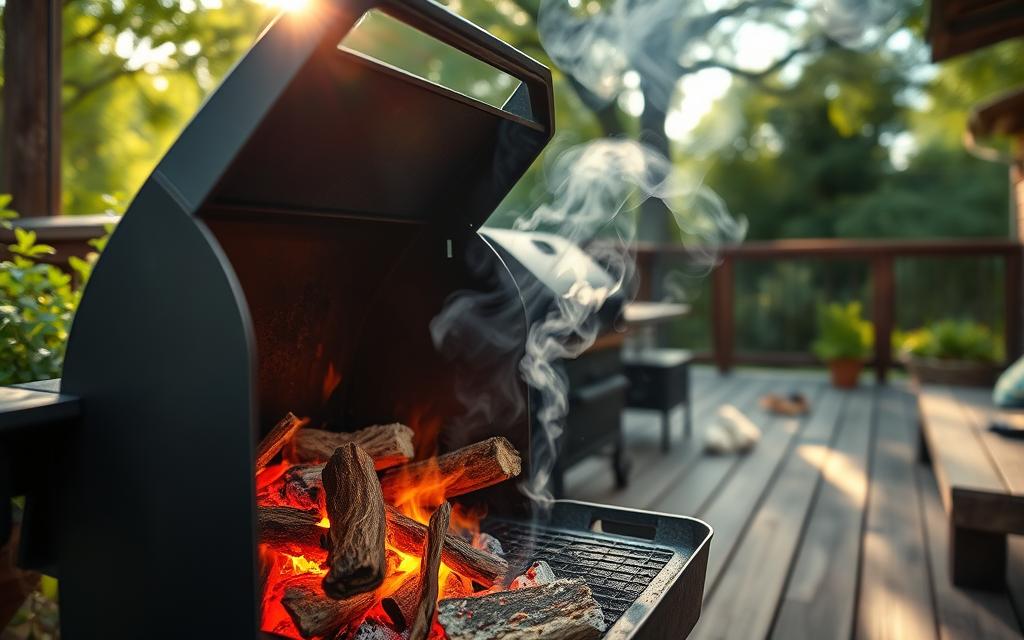
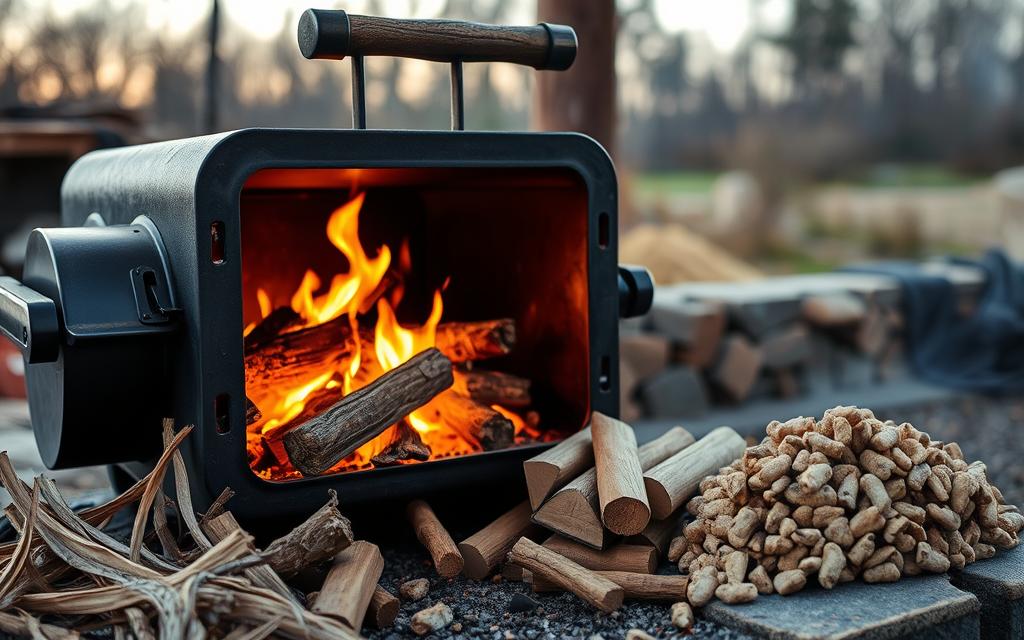
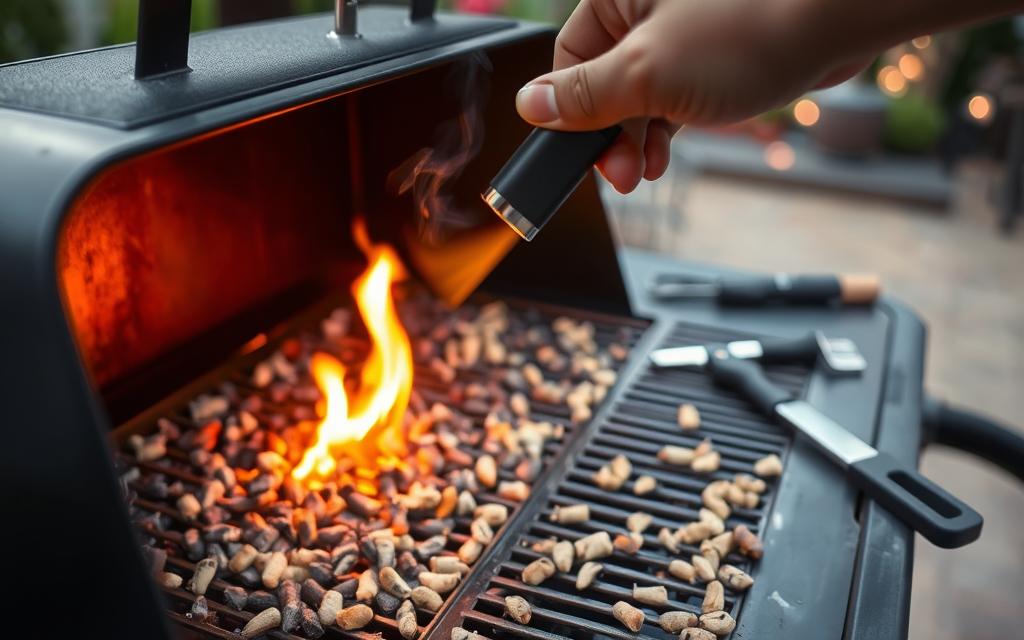
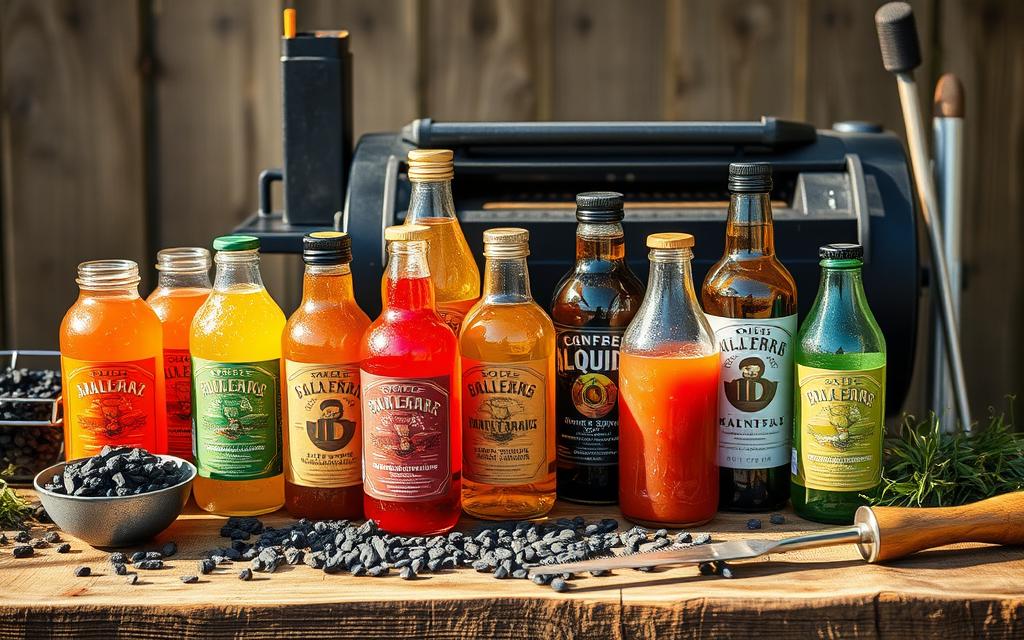
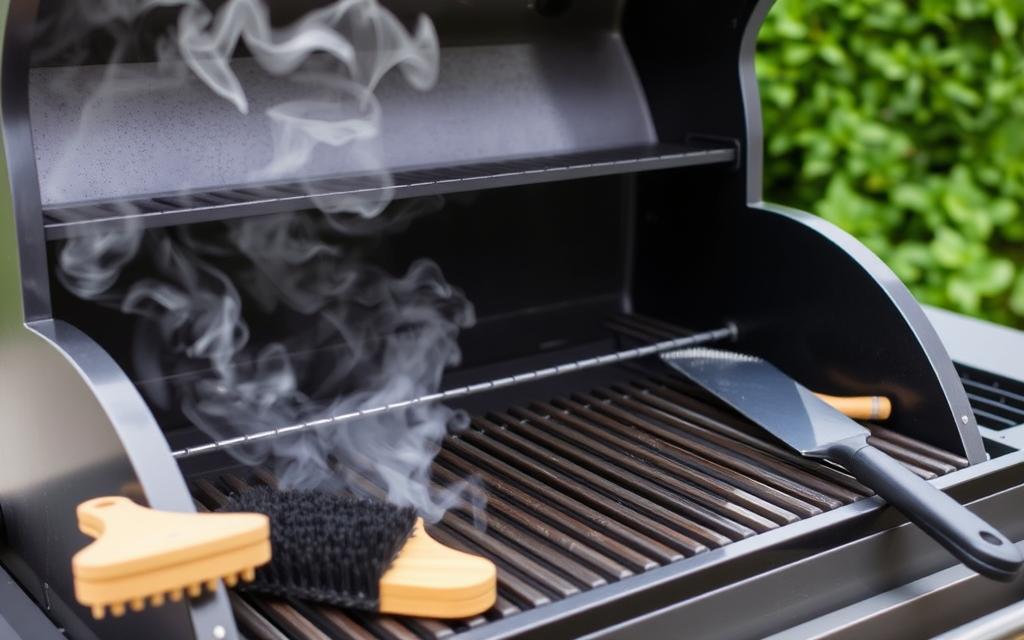
Leave a Reply